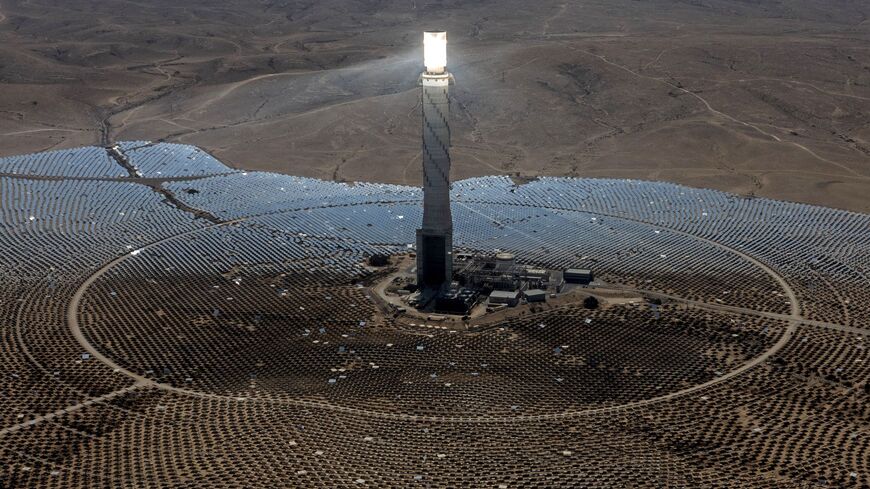TEL AVIV, Israel — Israel is stepping up efforts targeted at protecting the environment through the enhanced use of renewable energy. To that end, Israeli Minister for Environmental Protection Tamar Zandberg arrived to Paris Dec. 5 to discuss the department’s Environmental Protection Review of Israel. Among other things, the review is expected to recommend advancing green energy policies in Israel while preserving open spaces.
Since the 1980s, as a result of mandatory solar water heating regulations, most homes and buildings in Israel have solar panels on their roofs to heat water. Also, since 2011, there are several on-ground solar farms in the south of the country. Another developing trend is that of kibbutzim and villages installing solar panels over their crops, and selling the generated energy to the national electricity grid. Still, generating electricity out of solar panels placed on the rooftops of private homes is rare in Israel.
As such, last month’s announcement of the “Sun for Everyone” nonprofit organization about two buildings signing an agreement to install commercial-energy solar panels, was an important first step in that direction. The “Sun for Everyone” initiative is cooperating with the public Israel Energy Forum to proliferate solar roofing. One of the two buildings is situated in the southern city of Beersheba and the other one in Carmiel in the north.
The Ministry of Energy is also taking steps to advance the production of clean energy with solar panels installed on the roofs of residential buildings.
In October 2020, the government released a decision stating that its target for the production of renewable energy was 20% of all energy consumed by 2025 and 30% by 2030. As part of this effort, the Ministry of Energy and the Israel Electricity Authority announced in May a program to achieve these goals, dividing them into three main focus areas: policy and regulation, the electricity network, and optimal use of potential land resources. Installing panels on residential rooftops falls into that third category.
At the same time, the ministry is aware of the many obstacles on the way to turning Israel into a clean energy superpower. For example, the May 2022 program explained that “many of the small roofs are shared by multi-occupant buildings so that it is becoming necessary to convince several households to install solar energy production systems.”
The ministry also noted several additional challenges, including “raising awareness, years before there is a return on the investment, and the steep cost of installing the solar energy production units as a percentage of monthly household expenses.”
Despite the challenges, the Ministry of Energy is moving forward with its sustainability plans. A government decision made last September approved a series of steps intended to help Israel transition to the production of cleaner energy.
The decision noted, “In a densely populated country like Israel, there is a clear priority to take advantage of potential space within built-up areas, and particularly on rooftops, most of which remain unused.” In addition to multifamily buildings, the policy is intended to include schools, preschools and all new, nonresidential construction.
Environmentalist Yael Cohen Paran is the founder of the Israeli Energy Forum and a leader of the “Sun for Everyone” group, which is a joint effort of the Israel Energy Forum and the Jewish National Fund. She told Al-Monitor that residences account for 80% of built-up areas in Israel, and 94% of this consists of apartment buildings with more than one residence. As such, the greatest potential for the production of solar energy can be found on the roofs of these joint residences.
Eitan Parnass, general director of the Green Energy Association of Israel, said this February that Israel is "heading toward an energy crisis.” According to Cohen Paran, some 10% of all electricity produced in Israel will ideally come from solar energy, with the ambitious goal of up to 100,000 multifamily buildings with energy production units installed on their roofs in the coming decade.
While this is optimistic, Cohen Paran also warns that the main obstacle inhibiting any breakthrough in the field is the lack of awareness of all relevant parties, from the residents of the building to various government officials. This results in excessive bureaucracy and a lack of support from the government itself.
One example of this lack of awareness is the fact that until now, Israel has failed to meet its own objectives for the production of renewable energy. During the first half of 2022, only 10% of energy produced in Israel came from renewable sources. Doubling this by 2025 is not going to be easy.
As an example of the bureaucracy, Cohen Paran noted that a multifamily building cannot take a loan in order to install solar panels. Instead, it must hire the services of a solar energy company that invests in the projects and provides maintenance to the system for a 25-year contract.








